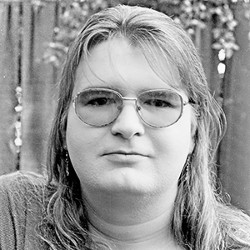by Gwendolyn Ann Smith

It was one of those rare moments of kismet. I had just come downstairs and turned on the television. On it was an attractive young woman with brown hair curled away from her face, and a sleeveless, purple dress. She smiled and spoke.
"My name is Sarah McBride, and I am a proud transgender American."
With that, she became a part of history as the first out transgender person to speak at a presidential convention.
Her brief speech was a powerful one, centering on the loss of her husband, Andy, who succumbed to cancer just days after their marriage. She spoke about her coming out, her time interning at the White House, and her hand in getting Delaware to pass transgender protections.
She also spoke about upcoming struggles, including the need to pass the Equality Act, which would amend the Civil Rights Act of 1964 to include sex, sexual orientation, and gender identity. McBride also spoke about the need to end the HIV/AIDS epidemic and halting the overwhelming violence against transwomen of color.
I first discovered that there were other transgender people in the world when I was a pre-teen, but it wasn't until the late 1990s at college that I discovered there was a transgender community. Well, the beginnings of a community, at best. I learned about a meeting being held monthly out of the back of a Holiday Inn about an hour or so from home. In-between those monthly meetings, sometimes we'd visit each other's homes, or go to a "friendly" bar or eatery and sit somewhere in the back.
The conventions of the time, however, suggested it was best we did not meet at all. The notion was that the more of us in any one given place, the more likely we'd all be outed and face danger. At the time, too, being a transgender person was still very much a shameful secret to have for many, and this notion of living in safe isolation only fed into out guilt.
For many who were aiming for surgical intervention, too, it was considered part of the process to divorce from one's past life entirely, creating a new identity and "go stealth." Some therapists at the time also pushed their transgender patients to also not develop friendships with other transgender people, and would threaten the loss of their care to ensure it.
Once the Internet came along, all this changed. Transgender people could, at last, meet and share with each other, and even associate with non-transgender people within what we then called "cyberspace." Nevertheless, this remained a pursuit largely behind one's closed doors. The nascent transgender community was small in visible number and in spirit, and the notion of being out and visible was extremely uncommon.
The cost of being out in any sort of public sense was simply too high for most. The notion of being out and in politics then was something largely in the realm of pure fantasy.
A lot has changed in twenty years. Now, I can turn on my television and see a transwoman proudly speaking at the Democratic National Convention. I can be proud for her, I can be proud for me, and I can be proud for my community.
It has been an amazing ride getting to this point. From those early days of backroom meetings, to the work of radical groups like TS Menace and more politically cautious groups like NCTE, to the time we live in now, past the so-called "tipping point" of transgender people in popular culture. We now live in a time when an out transwoman can take the stage at a national convention — and be broadcast around the country — and discover that she is not jeered off stage.
McBride, as groundbreaking as her speech was, may end up a footnote from a convention that brought a lot of firepower to the microphone. For that matter, it was another speaker that night, Khizr Khan, who will likely end up noted even more for his speech and the fallout in the wake of it. This is an okay thing.
As important as McBride's speech, let it too serve as a point along a much longer path.
At the Democratic National Convention, in addition to McBride, were a total of 27 out transgender delegates. This is, as you could imagine, the highest number of trans delegates ever at a political convention.
Among those delegates, Marisa Richmond was the official timekeeper for the convention. Richmond is the first transgender woman to be appointed to a local government board in her home state of Tennessee.
Next time the Democratic National Convention rolls around, we may see more transgender delegates. We may see another transgender woman filling Richmond's shoes. We may even see more speakers like McBride.
Yet, at some point, we're going to go beyond being merely delegates, timekeepers, and speakers. Eventually we will be there because of the political offices we have gained in our home districts, serving in local and state positions. Yes, we may eventually see us in congress, or vying for the Presidency itself.
There were transgender people for centuries before me. We began to flourish in the first half of the 20th century, leading to Christine Jorgensen pushing the A-Bomb off the front of newspapers nationwide. We continued to grow, taking a mere twenty years to go from that nascent community hidden in bars and hotels to addressing one of the biggest political events in the country.
What can we accomplish in the next twenty? What might the rest of this century hold for the transgender community? We've not only grown, but we shall continue to grow.










